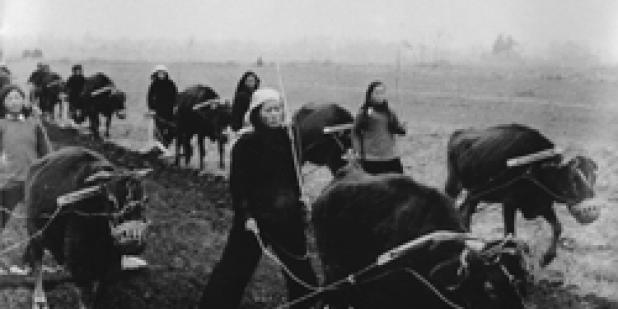Join us for a free one-day workshop for educators at the Japanese American National Museum, hosted by the USC U.S.-China Institute and the National Consortium for Teaching about Asia. This workshop will include a guided tour of the beloved exhibition Common Ground: The Heart of Community, slated to close permanently in January 2025. Following the tour, learn strategies for engaging students in the primary source artifacts, images, and documents found in JANM’s vast collection and discover classroom-ready resources to support teaching and learning about the Japanese American experience.
Rural Women and China's Disappearing Collective Past
The UCLA Center for Chinese Studies presents Gail Hershatter. In this talk, she explores changes in the lives of women in rural Shaanxi province during the early decades of state socialism, the 1950s and 1960s, comparing them to the lives of women in contemporary rural China.
Where

What can we learn about the Chinese revolution by placing a doubly marginalized group—rural women—at the center of the inquiry? And how does an examination of collectivization in China help us to understand the rapidly changing countryside today? In this talk, Gail Hershatter explores changes in the lives of women in rural Shaanxi province during the early decades of state socialism, the 1950s and 1960s, comparing them to the lives of women in contemporary rural China. She asks whether rural Chinese women had a revolution, and if so, when and what sort of revolution it was. Such questions encourage us to consider others that preoccupy historians: when is gender a useful category of historical analysis? How is the historical record shaped in interactions with the present moment? What counts as an event worth remembering? Who gets to decide?
Gail Hershatter is Distinguished Professor of History at the University of California, Santa Cruz. Her books include The Workers of Tianjin, 1900-1949 (1986), Personal Voices: Chinese Women in the 1980s (with Emily Honig, 1988), Dangerous Pleasures: Prostitution and Modernity in Twentieth-Century Shanghai (1997), Women in China’s Long Twentieth Century (2007), and The Gender of Memory: Rural Women and China’s Collective Past (2011). She is a former President of the Association for Asian Studies (2011-2012).
Featured Articles
Please join us for the Grad Mixer! Hosted by USC Annenberg Office of International Affairs, Enjoy food, drink and conversation with fellow students across USC Annenberg. Graduate students from any field are welcome to join, so it is a great opportunity to meet fellow students with IR/foreign policy-related research topics and interests.
RSVP link: https://forms.gle/1zer188RE9dCS6Ho6
Events
Hosted by USC Annenberg Office of International Affairs, enjoy food, drink and conversation with fellow international students.
Join us for an in-person conversation on Thursday, November 7th at 4pm with author David M. Lampton as he discusses his new book, Living U.S.-China Relations: From Cold War to Cold War. The book examines the history of U.S.-China relations across eight U.S. presidential administrations.




